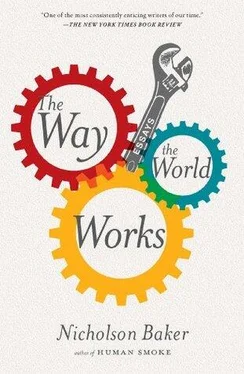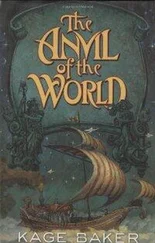Nicholson Baker - The Way the World Works
Здесь есть возможность читать онлайн «Nicholson Baker - The Way the World Works» весь текст электронной книги совершенно бесплатно (целиком полную версию без сокращений). В некоторых случаях можно слушать аудио, скачать через торрент в формате fb2 и присутствует краткое содержание. Год выпуска: 2012, Издательство: Simon & Schuster, Жанр: Публицистика, Критика, на английском языке. Описание произведения, (предисловие) а так же отзывы посетителей доступны на портале библиотеки ЛибКат.
- Название:The Way the World Works
- Автор:
- Издательство:Simon & Schuster
- Жанр:
- Год:2012
- ISBN:нет данных
- Рейтинг книги:4 / 5. Голосов: 1
-
Избранное:Добавить в избранное
- Отзывы:
-
Ваша оценка:
- 80
- 1
- 2
- 3
- 4
- 5
The Way the World Works: краткое содержание, описание и аннотация
Предлагаем к чтению аннотацию, описание, краткое содержание или предисловие (зависит от того, что написал сам автор книги «The Way the World Works»). Если вы не нашли необходимую информацию о книге — напишите в комментариях, мы постараемся отыскать её.
), here assembles his best short pieces from the last fifteen years.
The Way the World Works
OED
Modern Warfare 2
Through all these pieces, many written for
, and
, Baker shines the light of an inexpugnable curiosity.
is a keen-minded, generous-spirited compendium by a modern American master.
The Way the World Works — читать онлайн бесплатно полную книгу (весь текст) целиком
Ниже представлен текст книги, разбитый по страницам. Система сохранения места последней прочитанной страницы, позволяет с удобством читать онлайн бесплатно книгу «The Way the World Works», без необходимости каждый раз заново искать на чём Вы остановились. Поставьте закладку, и сможете в любой момент перейти на страницу, на которой закончили чтение.
Интервал:
Закладка:
Robinson Crusoe is Defoe’s most famous hoax. We now describe it as a novel, of course, but it wasn’t born that way. On its 1719 title page, the book was billed as the strange, surprising adventures of a mariner who lived all alone for eight-and-twenty years on an uninhabited island, “Written by H I M S E L F”—and people at first took this claim for truth and bought thousands of copies. This prompted an enemy satirist, Charles Gildon, to rush out a pamphlet, “The Life and Strange Surprising Adventures of Daniel de Foe, Formerly of London, Hosier, Who has lived above fifty Years all alone by himself, in the Kingdoms of North and South Britain.”
Addison called Defoe “a false, shuffling, prevaricating rascal.” Another contemporary said he was a master of “forging a story and imposing it on the world as truth.” One of Defoe’s nineteenth-century biographers, William Minto, wrote: “He was a great, a truly great liar, perhaps the greatest liar that ever lived.”
And yet that’s not wholly fair. A number of the things that people later took to be Defoe’s dazzlingly colorful tapestries of fabrication, weren’t. In 1718, in Mist’s Journal, Defoe gave a detailed account of the volcanic explosion of the island of St. Vincent, relying, he said, on letters he had received about it. A century passed, and doubts crept in. One Defoe scholar said that the St. Vincent story was imaginary; a second said it was tomfoolery; a third said it was “make-believe” and “entirely of Defoe’s invention.” But the island of St. Vincent had actually blown up, and it had made a lot of noise as it blew. Defoe had done his journalistic best to report this prodigy.
Something similar happened in the case of A Journal of the Plague Year . When Defoe published it, he, as usual, left himself off the title page, ascribing the story to H.F. “Written by a Citizen,” the title page falsely, sales-boostingly claimed, “Who Continued All the While in London.” People believed that for a while, but by 1780, at least, it was generally known that Defoe was the book’s author. Then someone did some arithmetic and realized that Defoe had been a young child when the plague struck London — whereupon they began calling the book a historical novel, unequaled in vividness and circumstantiality. Walter Raleigh, in his late-nineteenth-century history of the English novel, called the book “sham history.” In a study of “pseudofactual” fiction, Barbara Foley says that the Plague Year “creates the majority of its particulars.” And John Hollowell, investigating the literary origins of the New Journalism, writes that Defoe’s book is “fiction masquerading as fact.” Is it?
One night H.F. visits the forty-foot burial trench in Aldgate Churchyard, near where he lives. “A terrible pit it was,” he writes, “and I could not resist my curiosity to go and see it.” He watches the dead-cart dip and the bodies fall “promiscuously” into the pit, while a father stands silently by. Then the father, beside himself with grief, suddenly lets out a cry. Another time, H.F. describes the butchers’ market. “People used all possible precaution,” he says. “When any one bought a joint of meat in the market, they would not take it out of the butcher’s hand, but took it off the hooks themselves. On the other hand, the butcher would not touch the money, but have it put into a pot full of vinegar, which he kept for that purpose.”
A Journal of the Plague Year is an astounding performance. It’s shocking, it’s messy, it’s moving, it sobs aloud with its losses, it’s got all the urgency and loopingly prolix insistence of a man of sympathy who has lived through an urban catastrophe and wants to tell you what it was like. The fear of death, notes H.F., “took away all Bowels of love, all concern for one another.” But not universally: “There were many instances of immovable affection, pity and duty.” And Defoe’s narrator is at pains to discount some of the stories that he hears. He is told, for example, of nurses smothering plague victims with wet cloths to hasten their end. But the particulars are suspiciously unvarying, and in every version, no matter where he encounters it, the event is said to have happened on the opposite side of town. There is, H.F. judges, “more of tale than of truth” in these accounts.
Still, there’s the false frame. The story isn’t really being told by H.F., it’s being told by Defoe. That’s clearly a forgery — although more understandable when you learn that Defoe had an uncle with those initials, Henry Foe. Henry was in fact a saddler, who lived in Aldgate near the burial pit. In order to launch himself into the telling of this overwhelmingly complex story of London’s ordeal, Defoe needed to think and write in his uncle’s voice. The “I” is more than a bit of commercial-minded artifice. The ventriloquism, the fictional first-person premise, helped Defoe to unspool and make sequential sense of what he knew. He sifted through and used a mass of contemporary published sources, as any journalist would, and he enlivened that printed store with anecdotes that people had told him over the years. (His father could have been a source for the butcher’s vinegar pot.) The book feels like something heartfelt, that grew out of decades of accumulated notes and memories — although written with impressive speed. It doesn’t feel like an artificial swizzle of falsifications.
In 1919, a young scholar, Watson Nicholson, wrote a book on the sources of Defoe’s Journal of the Plague Year . He was quite upset by the notion that the Journal was now, without qualification, being called a novel. In his book Nicholson claimed to have established “overwhelming evidence of the complete authenticity of Defoe’s ‘masterpiece of the imagination.’” There was not, Nicholson said, “a single essential statement in the Journal not based on historic fact.” True, Defoe had a way of embroidering, but even so, “the employment of the first person in the narrative in no sense interferes with the authenticity of the facts recorded.”
Other critics agreed. In 1965, Frank Bastian crosschecked what Defoe said in the Journal against Pepys’s Diary, which Defoe couldn’t have seen because it wasn’t decoded until a century later. “Characters and incidents once confidently asserted to be the products of Defoe’s fertile imagination,” wrote Bastian in 1965, “repeatedly prove to have been factual.” Introducing the Penguin edition of the Plague Year in 1966, Anthony Burgess wrote: “Defoe was our first great novelist because he was our first great journalist.”
Six thousand people a month died in London’s plague, most of them poor. The locations of many burial pits passed from memory. One was later used, according to Defoe, as a “yard for keeping hogs”; another pit was rediscovered when the foundation of a grand house was being dug: “The women’s sculls were quite distinguished by their long hair.” Is the author being a reporter here, or a novelist? We don’t know. We want to know.
Daniel Defoe seems to have needed a pocketful of passports to get where he was going. But the moral of his story, at least for the nonfictionist, still is: Never Invent. People love hoaxes in theory — from a distance — but they also hate being tricked. If you make sad things up and insist that they’re true, nobody afterward will fully trust what you write.
(2009)
From A to Zyxt
Ammon Shea, a sometime furniture mover, gondolier, and word collector, has written an oddly inspiring book about reading the whole of the Oxford English Dictionary in one go. Shea’s book resurrects many lost, misshapen, beautifully unlucky words — words that spiraled out, like fast-decaying muons, after their tiny moment in the cloud chamber of English usage. There’s hypergelast (a person who won’t stop laughing), lant (to add urine to ale to give it more kick), obmutescence (willful speechlessness), and ploiter (to work to little purpose) — all good words to have on the tip of your tongue when, for example, you’re stopped for speeding.
Читать дальшеИнтервал:
Закладка:
Похожие книги на «The Way the World Works»
Представляем Вашему вниманию похожие книги на «The Way the World Works» списком для выбора. Мы отобрали схожую по названию и смыслу литературу в надежде предоставить читателям больше вариантов отыскать новые, интересные, ещё непрочитанные произведения.
Обсуждение, отзывы о книге «The Way the World Works» и просто собственные мнения читателей. Оставьте ваши комментарии, напишите, что Вы думаете о произведении, его смысле или главных героях. Укажите что конкретно понравилось, а что нет, и почему Вы так считаете.












